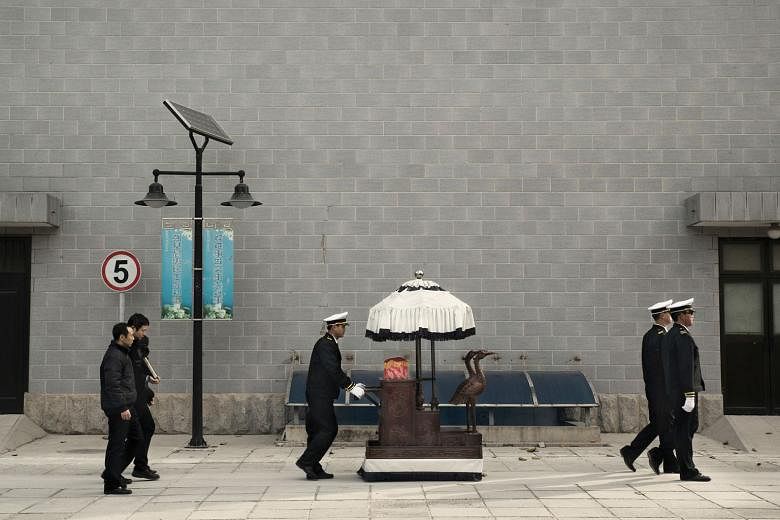BEIJING • Whether you are alive or dead, the Chinese authorities have made it clear that there is just not that much room for you.
Days after the government ignited a public outcry with urban development guidelines that called for an end to gated residential communities, a directive that encourages family members to be buried together or to have their remains disposed of in environmentally friendly ways has drawn criticism online.
Many commenters have linked the two measures, since both address the issue of population pressure on tight land supplies by asking citizens to change their way of life, and death.
On Wednesday, nine ministries including the Ministry of Civil Affairs and the National Development and Reform Commission released a joint directive, dated Feb 19, laying out the plan encouraging smaller graves and shared plots.
It also asks cities to provide incentives for degradable urns, scattering ashes and burials at sea. Breaches of burial rules by party officials, like building elaborate tombstones, will be investigated and "rectified", it says.
On Sunday, a directive released by the State Council, China's Cabinet, and the Central Committee called on cities to stop permitting the construction of gated housing complexes and to gradually open existing ones to the public to ease traffic congestion and improve land use. Many homeowners have protested against this, citing safety and quality of life concerns as well as the protection of private property.
In a statement, the nine ministries clarified that the burial directive was not a "rigid request" to ordinary Chinese.
Separately, the Ministry of Housing and Urban-Rural Development promised that homeowners' rights would be protected when opening up gated communities. But Internet users still expressed anger.
Comments that drew the most "likes" said ordinary citizens would have no issue with the two policies as long as Chinese leaders set an example, with many suggesting that environmentally friendly burials start with Babaoshan Revolutionary Cemetery, which is reserved for senior officials, revolutionary heroes and a few foreigners who contributed to the communist cause.
Under a survey conducted by a Chinese news portal on the idea of sharing a grave with relatives, a user in Changsha, Hunan province, wrote: "Tearing down walls, digging up family graves; this is the length to which reform has gone?"
The survey, which received 12,000 responses by Thursday afternoon, showed 46.2 per cent approving of the suggestion and 42.4 disapproving. But the comments section attracted more than 76,000 comments, which were overwhelmingly critical.
The Chinese authorities have been encouraging frugal burials in recent years in the face of land shortages and exorbitant cemetery prices. There have been sporadic reports in Chinese news media that the prices for grave plots are often higher than for apartments. Many cities are offering cash awards of 800 yuan (S$171) to 15,000 yuan for families who choose sea burials or other land-sparing alternatives.
The ashes of leader Deng Xiao- ping, who died in 1997, were scattered at sea. The ashes of Premier Zhou Enlai, who died in 1976, were scattered over a reservoir on the outskirts of Beijing and in rivers.
NEW YORK TIMES

